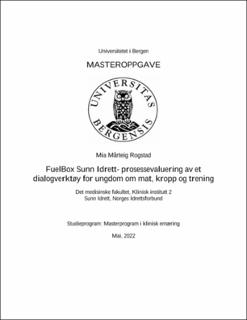| dc.contributor.author | Rogstad, Mia Mårteig | |
| dc.date.accessioned | 2022-06-16T01:29:25Z | |
| dc.date.available | 2022-06-16T01:29:25Z | |
| dc.date.issued | 2022-05-13 | |
| dc.date.submitted | 2022-06-14T22:03:48Z | |
| dc.identifier.uri | https://hdl.handle.net/11250/2998951 | |
| dc.description.abstract | Bakgrunn: Dialogverktøyet FuelBox Sunn Idrett er et potensielt tiltak for idrettsungdom for å igangsette samtaler og fremme refleksjon rundt vanskelige temaer som mat, kropp og trening. Spiseforstyrrelser er et alvorlig samfunnsproblem, og særlig idrettsungdom representerer en høyrisikokultur med økende forekomst. Sunn Idrett er et satsningsområde i Norges idrettsforbund hvor et sentralt mål er å heve kompetansen til trenere og foreldre, og det er viktig at idretten er bevisst utfordringen og iverksetter forebyggende tiltak. Tidlig identifisering og håndtering står sentralt i forebyggingen som må til for å redusere antall som rammes av kompliserte tanker og handlinger knyttet til mat, kropp og trening. Mål: Hovedmålene var 1) å implementere FuelBox Sunn idrett i pilotgrupper på idrettsgymnas og i idrettsklubber, og 2) gjøre en prosessevaluering med ungdommen og trenere rundt hvordan bruken av verktøyet oppleves. Forskningsspørsmålet var «Hvordan opplever idrettsungdom gjennomføringen av dialogverktøyet FuelBox Sunn Idrett?». Metode: FuelBox Sunn Idrett ble brukt som intervensjon i et fotballag (15 utøvere), gutter 16 år. Dialogverktøyet ble brukt i grupper på tre. I løpet av et tidsrom på 14 dager ble dialogverktøyet brukt fem ganger på ca. 35 minutter hver gang. Et kvantitativt spørreskjema ble brukt etter hver av de fem gjennomføringene, med spørsmål om temaenes relevans og deltakernes opplevelse av gjennomføringen, hvor deltakerne rapporterte på en visuell analog skala fra 0.100. Etter siste gjennomføring ble et kvalitativt intervju gjennomført. Resultat: Lagets totale skår på det kvantitative spørreskjema varierte fra gang til gang, men var generelt høy med verdier fra 64,1 til 87,8. Laveste skår for individuell gruppe var 57,2 (SD 13,9) og høyest skår 93,1 (SD 3,8). Positiv respons ble støttet av det kvalitative intervjuet. Konklusjon: Deltagende pilotgruppe ønsket å fortsette med FuelBox Sunn idrett og fant nytte av bruken av dialogverktøyet. Det bør gjennomføres oppfølgingsstudier, inkludert unge idrettsutøvere fra ulike idretter, i ulike aldersgrupper, samt utøvere fra begge kjønn. | |
| dc.description.abstract | Background: The communication tool FuelBox Sunn Idrett is a potential measure for young athletes to initiate conversations and promote reflections on difficult topics such as food, body and exercise. Eating disorders are a serious societal problem, and especially young athletes represent a high-risk group with an increasing incidence. Sunn Idrett is a focus area in the Norwegian Sports Confederation where a key goal is to enhance the competence of coaches and parent´s. It is important that the sports societies are aware of the challenge and implement preventive measures. Early identification and management is part of the prevention that is needed to reduce the number affected by the complicated thoughts and actions related to food, body and exercise. Aims: The main aims were to 1) implement FuelBox Sunn Idrett in pilot groups at sports schools and sports clubs, and 2) do a process evaluation with the athletes and coaches about how the use of the tool is experienced. The research question was "How do adolescence athletes experience the implementation of the dialogue tool FuelBox Sunn Idrett?” Method: FuelBox Sunn Idrett was used as an intervention in a football team (15 athletes), boys 16 years. The dialogue tool was used in groups of three. During a period of 14 days, the dialogue tool was used five times in approx. 35 minutes each time. A quantitative evaluation form was used after each of the five implementations, with questions about the topics relevance and the participants experience of the implementation, reported on a visual analogue scale from 0-100. After the last implementation, a qualitative interview was conducted. Results: Total group score on the quantitative evaluation forms varied from time to time but was generally high with values from 64,1 to 87,8. Lowest score was at 57,2 (SD 13,9) and the highest score was 93,1 (SD 3,8). Positive response was supported by the qualitative interviews. Conclusion: The participating pilot group wanted to continue with FuelBox Sunn Idrett and found benefit from the use of the dialogue tool. Follow-up studies should be conducted, including young athletes from different sports, in different age groups, as well as athletes from both sexes. | |
| dc.language.iso | nob | |
| dc.publisher | The University of Bergen | |
| dc.rights | Copyright the Author. All rights reserved | |
| dc.subject | idrett | |
| dc.subject | spiseforstyrrelser | |
| dc.subject | dialogverktøy | |
| dc.subject | Sunn Idrett | |
| dc.subject | idrettsungdom | |
| dc.subject | FuelBox | |
| dc.title | FuelBox Sunn Idrett- prosessevaluering av et dialogverktøy for ungdom om mat, kropp og trening | |
| dc.title.alternative | FuelBox Sunn Idrett- process evaluation of a communication tool for adolescence about food, body and exercise | |
| dc.type | Master thesis | |
| dc.date.updated | 2022-06-14T22:03:48Z | |
| dc.rights.holder | Copyright the Author. All rights reserved | |
| dc.description.degree | Masteroppgave i klinisk ernæring | |
| dc.description.localcode | NUCLI395 | |
| dc.description.localcode | MAMD-NUCLI | |
| dc.subject.nus | 769917 | |
| fs.subjectcode | NUCLI395 | |
| fs.unitcode | 13-24-0 | |
